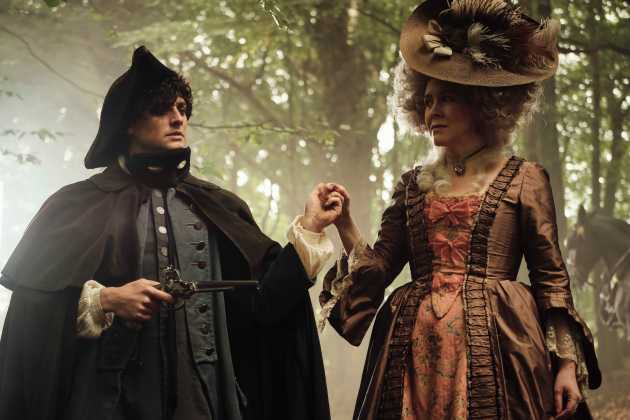‘Timestalker’ Review: Alice Lowe’s Python-esque Anti-Romcom Is A Dark And Bloody Delight – SXSW
- Oops!Something went wrong.Please try again later.
- Oops!Something went wrong.Please try again later.

Love never dies, but a lot of people do in Alice Lowe’s gloriously bloody valentine to the romantic comedy. Spanning so much time that it practically goes back to the beginning of it, Timestalker is an ambitious project that not only works, it coheres in a way that cements Lowe as a genuine and quite visionary comedic talent. It recalls classic Monty Python — it’s often very, very stupid and the same time very, very clever — but most of all it’s an idea of what might have been if that all-male team had ever had a woman or two in its core lineup.
Lowe set out her stall in 2016 with Prevenge, a horror comedy in which a bereaved pregnant woman is driven to avenge her late husband, incited to murder by her unborn baby. Timestalker doesn’t fall far from that tree, being another satirical comment on how male society views women as creatures ruled by hormones and emotion. But though its scope is bigger than Prevenge, Timestalker doesn’t have that much more money to play with — and, like the Pythons’ period films, it doesn’t try to persuade us that it has.
More from Deadline
This deliberate disjunct between ambition and budget seals the deal here, and with a cast of recurring actors who play the same roles in different guises, it creates an enchanting, diffusely lit and willfully lo-fi dream world that speaks to the self-absorbed intimacy of its lead character’s headspace.
That woman would be Agnes (Lowe), who we first meet in 1688 as a Scottish weaver who has fallen for the charms of a heretic preacher (Aneurin Barnard, who also plays a host of other characters that reappear in Agnes’s life for the next few hundred years). After he’s arrested by the authorities, his execution is set to take place before an audience of ghoulish gawkers (“Did you go to the last one?” asks the local fishwife. “It was terrible — he died straight away!”). Things don’t quite go according tp plan, though, and the pair are reunited in 1793. By this time, Agnes is a wealthy bewigged woman, married to a rich and dominating man George (Nick Frost); she feels unfulfilled and is haunted not just by memories of a past life but “a yearning to journey where I have not been.”
Barnard turns back up in her life, this time as “Alex Nine-Ribbons”, a dismal footpad who craves notoriety, which the now-lovestruck Agnes gives him by allowing him to rob her after forcing her carriage driver to ride backward and forward in the woods where she knows he operates. But the highwayman does not respond to her unconditional love, setting Agnes up for an eternity of disappointment that culminates in an extended sequence set in 1980. Agnes now is living in New York and obsessed with a British new romantic pop star called Alex Phoenix (Barnard again). This is where it all boils over, and Agnes — now exquisitely permed and nearly as much aerobicized — finally confronts the object of her affections in a last-ditch attempt to break the cycle.
The concept of a centuries-spanning, anti-romcom Groundhog Day would be rich enough material for a decent comedy show these days, but as the backbone of a feature it proves unexpectedly juicy here, and the supporting cast — Frost, Jacob Anderson, Kate Dickie and the scene-stealing Tanya Reynolds as Agnes’ longtime bestie — bolsters what so easily could have been a one-joke movie. But as writer-director, Lowe goes surprisingly deep into Agnes’ tragic investment in her doomed romantic attachment (“He’s Beauty, and I’m the Beast”), to the extent that we start to root for her — and buy into the film’s rough-edged magic realism — seduced in part by an atmospheric soundtrack by UK duo Toydrum.
This is all (briefly) threatened when the ’80s section plays out and Agnes goes into therapy, bringing in the creeping possibility that there could be a rational explanation for all this. Thankfully, this turns out to be a playful tease; from her long-standing involvement in cult TV comedy (Darth Marenghi’s Darkplace) and low-budget genre films (like Ben Wheatley’s Sightseers), Lowe has a very sophisticated understanding of her audience, and she knows very well that a film like this has to deliver more than just the out of the ordinary.
More important, she knows what’s funny, and though Timestalker is very well conceived and edited, with its visual rhymes and returning concepts (lovebirds and heart shapes, both staples of romantic fiction), the jokes all land, notably a jet-black jaw-dropper involving the death of a major rock star. Somehow, Lowe has the wide-eyed innocence to carry it all off, a very subversive gift indeed when making a film about monomaniacal erotic obsession that’s rife with graphic beheadings, rogue dildos, and gratuitous electric-blue Lycra leggings.
Title: Timestalker
Festival: SXSW (Narrative Spotlight)
Sales agent: HanWay
Director/screenwriter: Alice Lowe
Cast: Alice Lowe, Jacob Anderson, Aneurin Barnard, Tanya Reynolds, Nick Frost
Running time: 1 hr 29 min
Best of Deadline
Oscars: Every Best Picture Winner Back To The Beginning In 1929
TV Cancellations Photo Gallery: Series Ending In 2024 & Beyond
Hollywood & Media Deaths In 2024: Photo Gallery & Obituaries
Sign up for Deadline's Newsletter. For the latest news, follow us on Facebook, Twitter, and Instagram.

